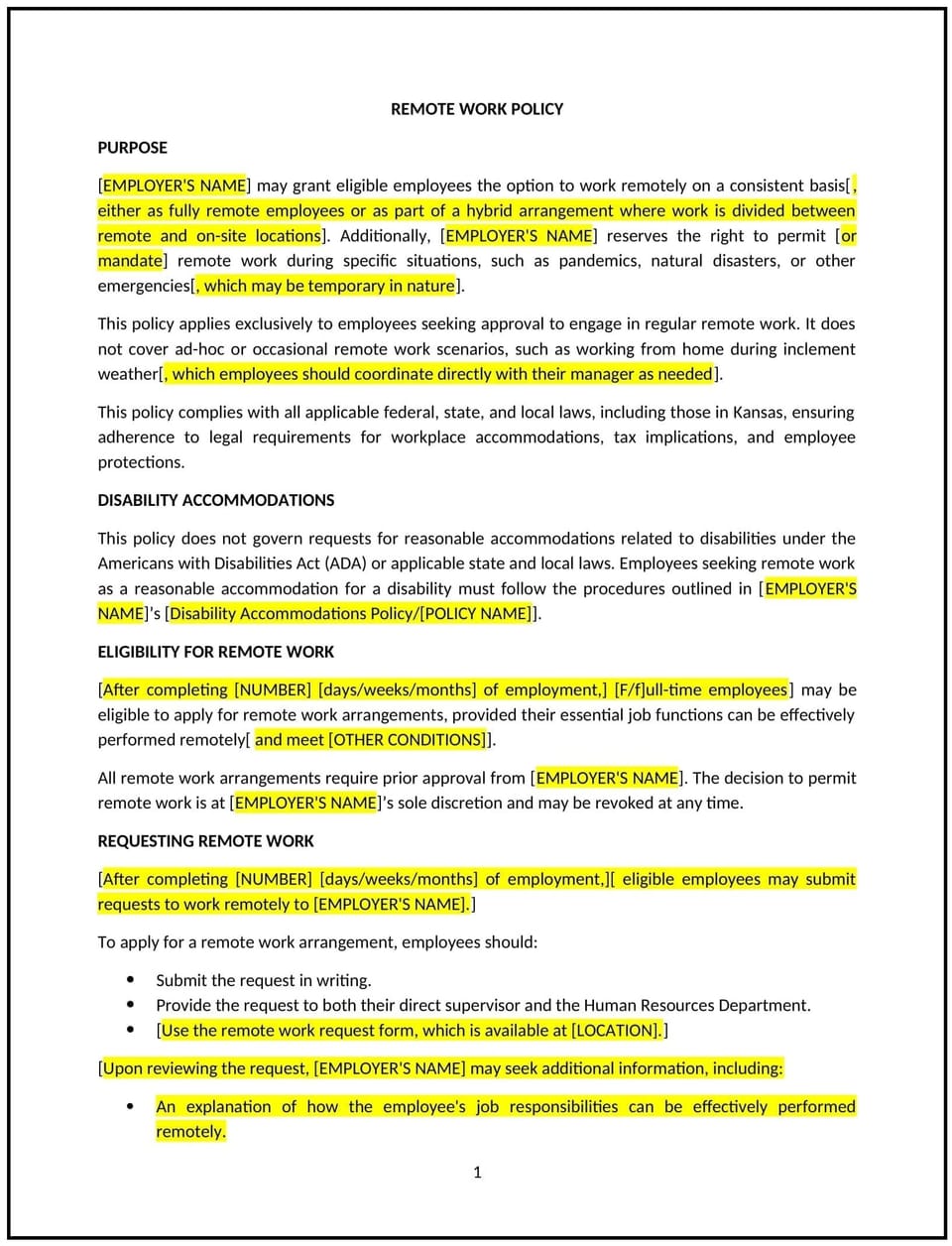Remote work policy (Kansas): Free template

Remote work policy (Kansas)
A remote work policy helps Kansas businesses manage employees who work outside of the traditional office environment, whether from home, a co-working space, or other locations. This policy outlines expectations, guidelines, and procedures for remote work, including communication, productivity, data security, and equipment management.
By implementing this policy, businesses can provide employees with flexibility while ensuring that work is performed efficiently and securely.
How to use this remote work policy (Kansas)
- Define remote work eligibility: Businesses should specify which positions or types of employees are eligible for remote work and under what conditions, such as job function, performance, or seniority.
- Set communication expectations: The policy should outline how employees should communicate with their team, managers, and clients while working remotely, including the preferred methods (e.g., email, video calls, instant messaging) and response times.
- Establish work hours and availability: Businesses should specify whether employees are expected to work during regular office hours or have flexible schedules and outline expectations regarding availability for meetings and collaboration.
- Define performance expectations: The policy should set clear performance goals, including productivity, quality of work, and deadlines. Businesses should specify how performance will be measured and how remote work may impact these expectations.
- Address equipment and technology requirements: Businesses should specify the technology, tools, and equipment required for remote work (e.g., laptops, VPN access, collaboration tools) and clarify whether employees are responsible for providing their own or if the company will provide equipment.
- Implement data security and confidentiality measures: The policy should outline the security protocols employees must follow to protect company data while working remotely, such as using encrypted communications, secure passwords, and safeguarding company-owned devices.
- Set boundaries for remote work: The policy should define clear boundaries for remote work, such as designated workspaces at home, to prevent distractions and maintain productivity.
- Review and update regularly: Businesses should periodically review and update the remote work policy to ensure it remains relevant to business needs, technological advances, and legal requirements.
Benefits of using a remote work policy (Kansas)
- Increases employee satisfaction: A clear remote work policy allows employees the flexibility to work from home or other locations, which can improve work-life balance and job satisfaction.
- Expands talent pool: Offering remote work options can help businesses attract talent from a broader geographical area, particularly those who may not be located near the company’s physical office.
- Reduces overhead costs: Remote work can reduce the need for office space, utilities, and other operational costs, leading to savings for the business.
- Maintains productivity: A well-defined policy helps businesses ensure that remote employees remain productive by setting clear expectations for performance and communication.
- Supports business continuity: Having a remote work policy in place provides businesses with a plan for maintaining operations during unexpected disruptions, such as natural disasters or public health emergencies.
- Enhances trust and accountability: By defining expectations and measuring performance, businesses can build trust with remote workers and encourage accountability.
Tips for using this remote work policy (Kansas)
- Communicate the policy clearly: Businesses should ensure that all remote employees understand the policy, including expectations for communication, performance, and equipment.
- Offer training and resources: Provide remote workers with the necessary tools and training to be successful, such as software tutorials, project management tools, or communication platforms.
- Monitor performance regularly: While remote work offers flexibility, businesses should track employee performance to ensure that expectations are being met and provide feedback as needed.
- Encourage work-life balance: Businesses should encourage remote employees to maintain a clear boundary between work and personal time to prevent burnout and maintain overall well-being.
- Ensure data security: Businesses should implement secure networks and data protection protocols for remote work to safeguard sensitive information and prevent data breaches.
- Regularly review the policy: Businesses should assess and update the remote work policy periodically to ensure it continues to meet employee needs, company goals, and legal requirements.
Q: Why should Kansas businesses implement a remote work policy?
A: Businesses should implement a remote work policy to set clear expectations, maintain productivity, ensure data security, and provide employees with flexibility, which can improve satisfaction and retention.
Q: Who is eligible for remote work?
A: The policy should specify which employees or job positions are eligible for remote work, considering factors such as job responsibilities, performance, and business needs.
Q: Can employees set their own remote work schedule?
A: The policy should outline whether employees have flexibility in setting their own schedules or if they are expected to work during specific hours. Some businesses may allow flexible hours, while others may require employees to follow standard office hours.
Q: What equipment is needed for remote work?
A: The policy should specify what equipment and technology employees need to work remotely, such as laptops, internet connections, collaboration tools, and whether the company will provide this equipment or if employees need to supply their own.
Q: How do businesses ensure data security for remote workers?
A: Businesses should establish data security protocols for remote work, including using encrypted communication, secure passwords, and virtual private networks (VPNs) to protect sensitive company data.
Q: How will employee performance be measured in a remote work environment?
A: The policy should outline performance expectations, such as meeting deadlines, quality of work, and communication, and specify how these will be monitored (e.g., regular check-ins, project tracking tools).
Q: How often should businesses review and update their remote work policy?
A: Businesses should review the remote work policy at least annually or when there are significant changes to the company’s operations, technology, or legal requirements to ensure the policy remains effective and up to date.
This article contains general legal information and does not contain legal advice. Cobrief is not a law firm or a substitute for an attorney or law firm. The law is complex and changes often. For legal advice, please ask a lawyer.


